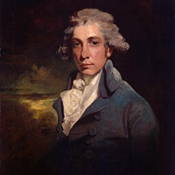
public domain
Richard Brinsley Sheridan
Playwright
Biography
Richard Brinsley Sheridan
Richard Brinsley Sheridan was born in Ireland but his family moved to London when he was seven years old. He was educated at Harrow and the family moved to Bath when he was 19. At Bath, he met the soprano Elizabeth Ann Linley. He fought two duels on her behalf before marrying her in 1772 at the age of just 21.
In 1775, Sheridan's first play, The Rivals, opened in 1775 but it was not an immediate success. Sheridan revised the play and upon its relaunch at London's Covent Garden, it immediately cemented Sheridan's reputation as a playwright. That same year, he wrote the farce, St. Patrick’s Day; Or, The Scheming Lieutenant, and collaborated with his father-in-law Thomas Linley on the opera The Duenna.
In 1776, Sheridan bought David Garrick's share of the Theatre Royal Drury Lane, along with Thomas Linley and the physician, James Ford. The men revived Restoration Comedy at the theatre, favoring the works of William Congreve.
In 1777 Sheridan revised John Vanbrugh’s play The Relapse (1696) into A Trip to Scarborough. He also wrote The School for Scandal, known today as one of the finest English comedy of manners. In 1779, he wrote The Critic (based on George Villiers' The Rehearsal).
Following this success, Sheridan turned to politics and became a Member of Parliament for the Whig Party for 32 years. However, his world then began to crumble around him. In 1809 the Theatre Royal Drury Lane burned down and Sheridan lost all his income from the theatre. He then lost his seat in Parliament in 1812 and began to fall into debt. He died in poverty in 1815 and is buried at Poets Corner in Westminster Abbey.
Shows
Shows associated with Richard Brinsley Sheridan
Monologues
Monologues from shows associated with Richard Brinsley Sheridan
Songs
Songs from shows associated with Richard Brinsley Sheridan
Scenes
Scenes from shows associated with Richard Brinsley Sheridan
Quizzes
Quizzes associated with Richard Brinsley Sheridan
Learning Modules
Learning modules associated with Richard Brinsley Sheridan
Additional Information
N/A